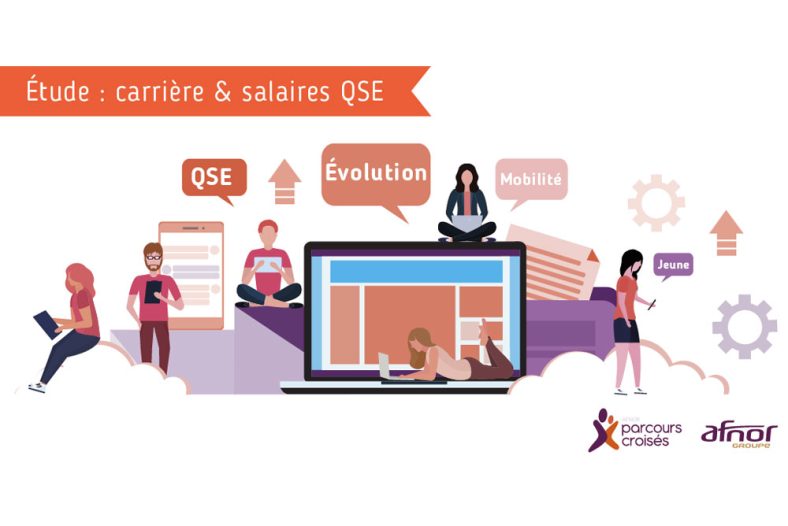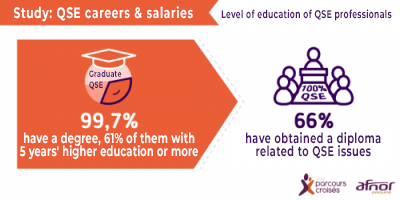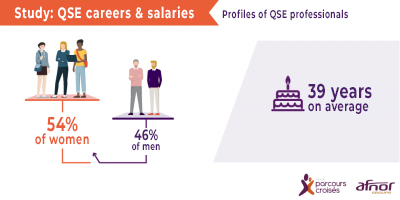QSE Managers: an X-ray of a key function

The AFNOR Group conducted a major survey for Parcours Croisés, the social network for QSE professionals, to find out more about their career paths, missions and remuneration. Portrait-robot of a profession that is becoming increasingly professional and strategic in organizations.
 Professionalization: this is the first lesson to be learned from the major study carried out by the AFNOR group for the Parcours Croisés social network, among its 17,000 members of the quality-safety-environment community. Nearly 3,000 people played the game and took a photo of themselves. Here’s an initial figure: 99.7% are graduates, the vast majority from specialized QSE training (two out of three), with 70% at bac + 4 level or above. By way of comparison, in 2010, only 55% of them had an equivalent level of qualification, an increase that can be explained by the rejuvenation of the profession. Today, the average age of the profession is 39, compared to 40 in 2010. And 19% of QSE managers are under the age of 30. “Tomorrow’s QSEs need dual training: technical training to master tools, manage audit mechanisms and acquire recognized expertise in these fields. And management training, so as to be able to use relational resources and be a pedagogue, so as to bring about changes in practices around them, always keeping in mind the notion of performance” , comments Alexis Roche, lecturer and head of the CIPG master’s program at IAE Lyon.
Professionalization: this is the first lesson to be learned from the major study carried out by the AFNOR group for the Parcours Croisés social network, among its 17,000 members of the quality-safety-environment community. Nearly 3,000 people played the game and took a photo of themselves. Here’s an initial figure: 99.7% are graduates, the vast majority from specialized QSE training (two out of three), with 70% at bac + 4 level or above. By way of comparison, in 2010, only 55% of them had an equivalent level of qualification, an increase that can be explained by the rejuvenation of the profession. Today, the average age of the profession is 39, compared to 40 in 2010. And 19% of QSE managers are under the age of 30. “Tomorrow’s QSEs need dual training: technical training to master tools, manage audit mechanisms and acquire recognized expertise in these fields. And management training, so as to be able to use relational resources and be a pedagogue, so as to bring about changes in practices around them, always keeping in mind the notion of performance” , comments Alexis Roche, lecturer and head of the CIPG master’s program at IAE Lyon.
 Is QSE a job for men or women? The breakdown reversed between 2010 and 2018: from 48% in 2010, the proportion of women now stands at 54%. Women are still in the minority in positions of responsibility,” notes Karine Georges, in charge of research for the AFNOR group. For example, 62% of managers are men. But the differences will gradually fade, as the 54% of women working in QSE are also younger (average age 37 vs. 41 for men) and more likely to have obtained a QSE diploma (70% vs. 62% of men). So, one day or other, they will be called upon to evolve.
Is QSE a job for men or women? The breakdown reversed between 2010 and 2018: from 48% in 2010, the proportion of women now stands at 54%. Women are still in the minority in positions of responsibility,” notes Karine Georges, in charge of research for the AFNOR group. For example, 62% of managers are men. But the differences will gradually fade, as the 54% of women working in QSE are also younger (average age 37 vs. 41 for men) and more likely to have obtained a QSE diploma (70% vs. 62% of men). So, one day or other, they will be called upon to evolve.
QSE managers: loyalty and seniority
With an average seniority of nine and a half years in the QSE world, professionals in the sector are increasingly experienced, demonstrating their attachment to their profession… But also their loyalty to their company: on average, they have only worked in two different organizations. This stability can be explained by the nature of the contracts: 94% permanent and 95% full-time, with executive status in 67% of cases. Half the respondents are managers.
 Another key factor is interest in the job. Over the last three years, two out of three respondents have seen their missions grow, most often as a result of company reorganization. Among these enriching activities: being involved in auditing missions is often cited: 85% of QSEs are involved in auditing, most often in internal auditing (72% versus 13% in external auditing). Having an international scope of action is also a source of enrichment, but few experience it on a daily basis: 70% of QSEs carry out their activities within national borders. Last but not least, QSE professionals like to work on a number of different subjects: quality, safety, risks and the environment are, quite logically, the ones they deal with on a daily basis, but their field of action sometimes also flirts with service excellence or hygiene, and even, to a lesser extent, with QWL, CSR or energy.
Another key factor is interest in the job. Over the last three years, two out of three respondents have seen their missions grow, most often as a result of company reorganization. Among these enriching activities: being involved in auditing missions is often cited: 85% of QSEs are involved in auditing, most often in internal auditing (72% versus 13% in external auditing). Having an international scope of action is also a source of enrichment, but few experience it on a daily basis: 70% of QSEs carry out their activities within national borders. Last but not least, QSE professionals like to work on a number of different subjects: quality, safety, risks and the environment are, quite logically, the ones they deal with on a daily basis, but their field of action sometimes also flirts with service excellence or hygiene, and even, to a lesser extent, with QWL, CSR or energy.
And what about compensation? The average fixed annual salary is €41,000 gross. This value covers a multitude of realities. As in other professions, there is a significant disparity between men (44.5 k€) and women (38 k€). Unsurprisingly, the more qualified QSE professionals are, the better they are paid. A difference that doesn’t fade with experience. Finally, whether in industry or the service sector, the public or private sector: the survey reveals no significant differences in remuneration according to field of activity. On the other hand, the size of the structure and its location, in the Paris region or elsewhere in France, are more significant factors. In addition, 47% of respondents say they also receive variable compensation, in the form of profit-sharing or bonuses linked to the achievement of objectives or merit: on average, €5,500 gross each year.
QSE professionals: high levels of satisfaction with positions of responsibility
But in the end, are the QSEs satisfied with their work? Out of 10, respondents gave a score of 6.43. This average figure masks major disparities. While the attractiveness of the position scores 8.27 out of 10, the remuneration is a modest 5.37. Other frustrations include involvement in strategic issues, which could be greater (5.79), and prospects for internal career development (5.82). On the other hand, the relationship with the manager (7.66) and the opportunity to upgrade skills (7.4) are very appealing. The higher up the hierarchy you go, the greater the responsibilities, the more satisfied QSEs are.
 What respondents expect in the future is, above all, greater recognition and involvement of their management in QSE issues. A movement that’s taking off! ” The QSE manager becomes a central figure. His tools, his methodology and his 360-degree view of the world are helping to place him higher and higher up the organizational ladder. A bridge between corporate governance and operations “comments Benoît Grossiord, teacher-researcher at Bordeaux Sciences Agro. And to support them, they can count on what they consider to be the essential qualities of a QSE manager: adaptability, rigor and communication.
What respondents expect in the future is, above all, greater recognition and involvement of their management in QSE issues. A movement that’s taking off! ” The QSE manager becomes a central figure. His tools, his methodology and his 360-degree view of the world are helping to place him higher and higher up the organizational ladder. A bridge between corporate governance and operations “comments Benoît Grossiord, teacher-researcher at Bordeaux Sciences Agro. And to support them, they can count on what they consider to be the essential qualities of a QSE manager: adaptability, rigor and communication.
Methodology
Parcours Croisés, the social network for QSE pros, conducted its survey, with the help of the AFNOR group, throughout October 2018, offering its 17,000 professional members the chance to answer a 10-15 minute questionnaire. Of these, 3,180 responded, with a total of 2,840 questionnaires usable, i.e. fully completed. This guarantees a reliable and representative sample of the trade. “Our aim was to gain a better understanding of the career paths and developments of these professionals, with the ambition of following this measurement over time by comparing it with other regular surveys. It was essential to gather testimonials from a wide variety of profiles, in order to reflect the realities of the market: whether they were managers, directors, coordinators, technicians, assistants or engineers; in charge of the three QSE themes, one of them or another mix of related themes”, explains Karine Georges, in charge of research at the AFNOR group. The 2018 survey can be compared with the 2010 survey in that it includes similar questions.
“QSE, an increasingly strategic function
 Benoît Grossiord, a teacher-researcher specializing in QRSE management of food chains at Bordeaux Sciences Agro, decodes the Parcours Croisés study in three questions and answers.
Benoît Grossiord, a teacher-researcher specializing in QRSE management of food chains at Bordeaux Sciences Agro, decodes the Parcours Croisés study in three questions and answers.
What are the main findings of this study?
For me, the most striking thing is the extent to which the position of QSE manager is becoming increasingly strategic in companies. Until a few years ago, this was essentially a technical position, overseeing everything that management put behind the notion of “quality assurance”. The situation has changed. Today, the QSE manager has become a central figure. His tools, his methodology and his 360-degree view of the world are all helping to place him higher and higher up the organizational ladder. It’s a bridge between corporate governance and operations.
How did this change come about?
Companies are faced with increasingly stringent and varied requirements, both regulatory and non-regulatory, particularly in terms of CSR. I see it in the food sector. In the past, it was enough to offer consumers a good, healthy product. Many other dimensions are now taken into account: respect for the environment, the nature of breeding, consideration for biodiversity, and so on. To meet these new demands, only the QSE manager has the right tools and methods to adapt to the company’s context. He naturally assumes the role of central point of contact, coordinating the various departments and fostering communication. His global vision encourages stakeholders to turn to him.
How will this continue in the years to come?
For me, this movement has only just begun. In the corporate world, taking risks into account and striving for continuous improvement have become essential. The CSR is set to become a pillar of the organization’s strategy. Today, who better than the QSE manager to master a company’s ecosystem, with all its risks and opportunities? Long seen as an obstacle to getting things done, the CSR will become a provider of concrete, tailored solutions, driving and raising awareness throughout the organization. This trend can already be seen in the agricultural and food sectors, where societal issues are very much to the fore. I’m deeply optimistic about the future of RQSE, which is a must for multinationals and SMEs alike. His mastery of performance and continuous improvement tools, combined with his interpersonal skills and great human qualities, will make him a key player in leadership.